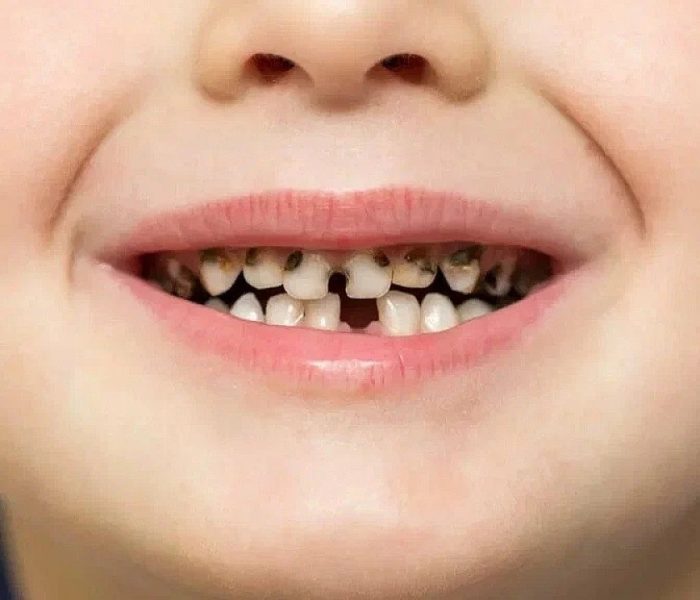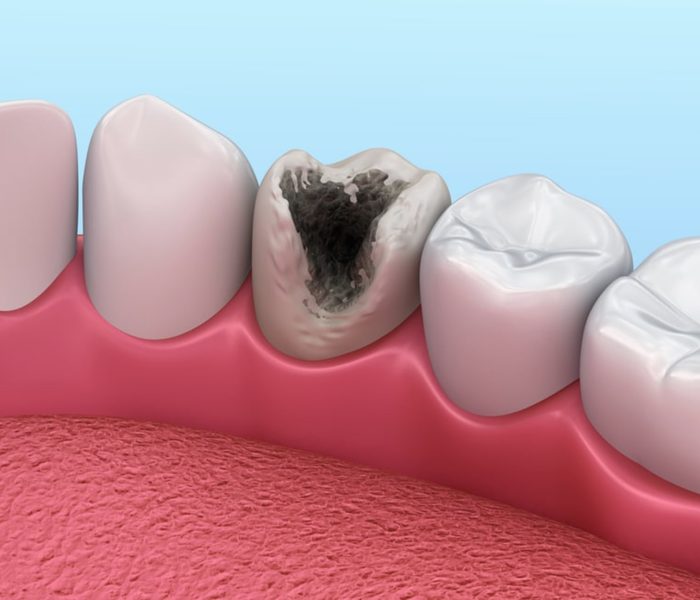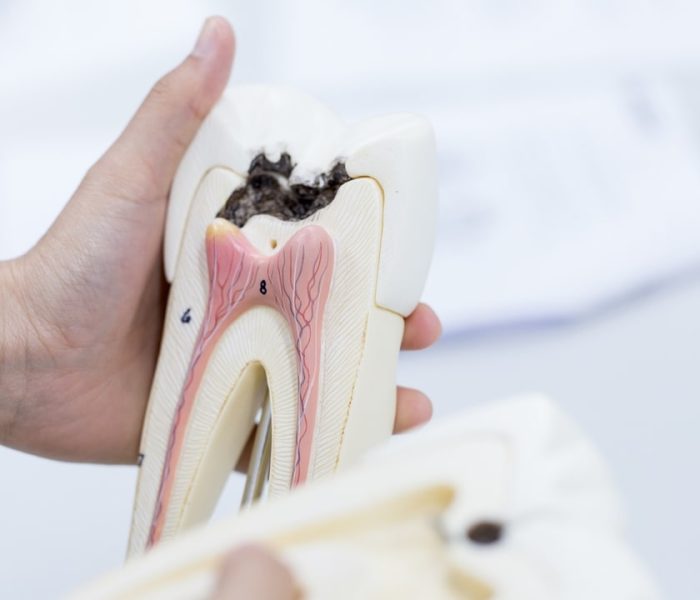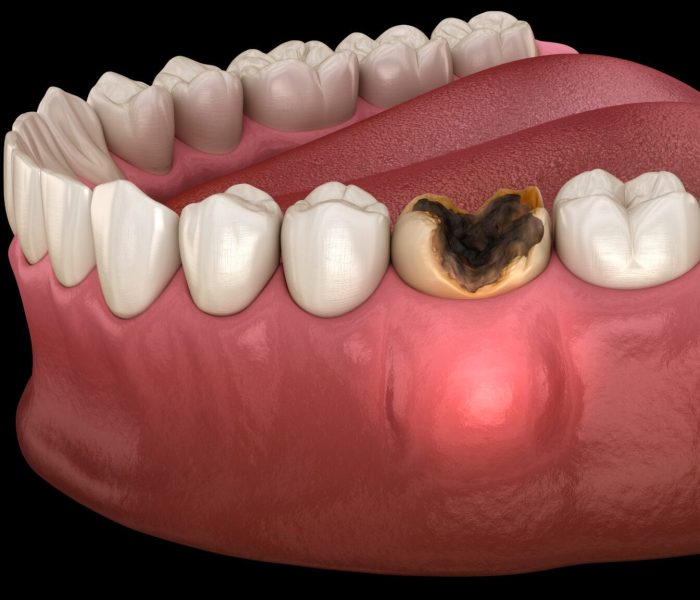A bacterial infection of the tooth, gums, or jawbone can result in a dental abscess. Such infections could be caused by tooth decay, gum disease, or a mouth injury. If treatment is not sought, the abscess may grow or spread to other body parts.
However, the factors that contribute to them occur in stages, and being aware of those stages can assist a person in managing or avoiding an abscess. This article explains tooth abscesses, their symptoms, possible causes, and how to treat them.
Let’s start!
What Is A Dental Abscess?
The development of a purulent process inside a tooth or the surrounding tissues is known as a tooth abscess. They develop when a person has a bacterial infection in one of the mouth’s following areas:
- Position dealing with the tooth pulp, which is the inner part of the tooth
- The gums
- The jawbone
Tooth abscesses, the leading cause among all types, originate from untreated cavities. However, they can also occur and grow from gum disease or an open wound in the mouth.
Stages of Tooth Decay:
Here are the different stages:
1. Enamel Decay
his refers to the destruction of the tooth’s exterior coating or enamel. In some patients, it is all internal; others may feel that their teeth quickly turn pale or red. White spots can appear on a tooth due to enamel degradation over time.


2. Dentin Decay
It is characterized by the breakdown of a layer beneath the tooth’s enamel. Pain and sensitivity are also possible sensations that several people may experience after their surgery.
3. Pulp Decay
This happens when bacteria get to the trench, deeper into the dentinal tubules of the inner part of the tooth. Like in a cavity, bacteria present within the tooth pulp may be capable of affecting the tooth’s nerve, resulting in severe pain. Even more often, the nerve is damaged, which means a person first feels a sharp pain and then feels nothing at all.


4. Abscess Formation
An abscess develops during the advanced stage of tooth decay when the infection has moved to the tooth’s nerve or into the gum or bone. The common symptoms that a person would observe are mild discomfort or pain around the affected tooth, and the gums in the region appear very inflamed and red.
Symptoms of An Abscess:
- Toothache that could spread to the jaw, ear, or face
- Enlargement or growth of the tongue, lips, mouth, or face, or development of a growth in the neck
- Enlarged lymphatic nodes, especially on the neck or regions around the head and facial areas
- Feeling generally sick
- A broken tooth
If an untreated tooth abscess is left untreated, bacteria may enter the bloodstream, leading to a severe, powerful, and sometimes life-threatening illness known as sepsis.
A few symptoms of sepsis are listed below:
- Fever or chills
- Fast heartbeat
- Fast breathing
- Breathlessness
- Feeling dizzy or faint
Causes of Dental Abscess:
When oral bacteria quickly proliferate and enter the tooth’s pulp or surrounding tissues, a tooth abscess results.
Here are the leading causes of tooth abscesses:
1. Untreated Cavities
The bacteria in the mouth form a hard structure known as plaque. Importantly, plaque can be reduced by using all common methods: brushing teeth, scraping gums, and visiting the dentist.
However, negligence in dental hygiene tends to complicate the situation. In the long run, the bacteria in the plaque start decaying the tooth, leading to tooth decay. If this situation is not resolved, the decay becomes deeper and forms an abscess.
2. Gum Disease
Gum disease is an infection and inflammation of the gums called periodontitis, whereas periodontal is related to gums.
3. Injury To The Mouth
An abscess in the tooth is also more likely to occur when there is trauma to the tooth and the surrounding tissues. Such injuries may take the form of surgical or traumatic injuries of the mouth area. If you see some warning signs, schedule an appointment with your healthcare provider immediately.
Treatment:
An untreated abscess can cause serious complications, such as:
- An infection that occurs in the bone
- Infection of the sinus or neck tissue
- An infection of the inner lining of the heart also referred to as infective endocarditis
If you need to treat a tooth abscess, schedule an appointment with your dentist. The dentist will give the patient antibiotics to eliminate the bacteria and prevent its further multiplication.
To avoid the recurrence of the infection, the dentist must also treat the cause of the abscess by filling the decayed tooth or treating the injured area.
Treatment may include:
- Filling cavities
- Using a procedure known as scaling and root planing, which removes the tartar at the base of the gums where periodontal diseases are found
- Benefiting general health through the restoration of chewer's teeth that may have been damaged or avulsed through crowns or implants
They may also need operations to excise their affected tissues because the infection may have damaged them.
Closing Thoughts
A tooth abscess is an inflammation caused by a bacterial infection within the tooth, gum, or jaw that forms a pus-filled pocket. It is caused by tooth decay, gum disease, or trauma to the teeth and gum tissues of the oral cavity. If left untreated, the underlying bacterial infection causing the abscess may spread to other body parts, leading to serious health complications.
A person who develops signs of a tooth abscess ought to consult their dentist promptly. The abscess and the cause must be treated, and this is possible with proper care. Proper oral hygiene and having your teeth cleaned as recommended can help prevent tooth abscesses.













